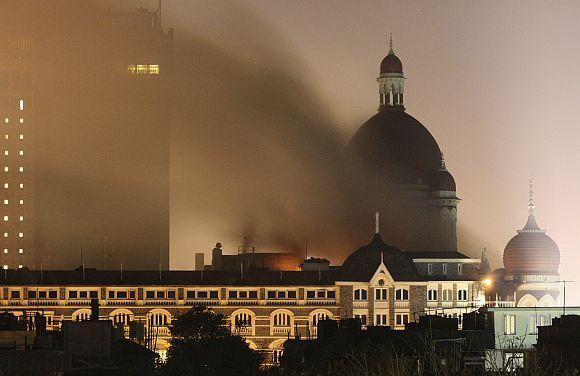
Former Intelligence Bureau special director Ravindra Narayan Ravi discusses various security issues daunting India in an interview Vicky Nanjappa. The National Investigation Agency, he states, could not pursue its very first case with professional vigour due to political interference as it was forced to soft-pedal the case against dreaded terrorists.
How do you see our security arrangements post the 26/11 terrorist attacks?
Security essentially has two components: preventive security -- that means capabilities to detect the threat beforehand and destroy or disable it before it strikes; and responsive security which includes capabilities to mitigate the impact of un-prevented threats.
The November 26 attacks shocked the country on inadequacies on both the counts. In the wake of the shock we made the right noises, but did not follow it up with right resolve and adequate resources.
Crucial to preventive security is the existence of an efficient intelligence infrastructure. We have not done anything worthwhile on this count. Intelligence infrastructure of the states is, by and large, decrepit. These are structurally and professionally deficient and thus incapable of effectively meeting the challenge. Even the Intelligence Bureau, the principal intelligence arm of the federal government, needs to re-invent itself.
Post-26/11 attacks we did make some progress on the responsive security in terms of strengthening the National Security Guard, creating its regional hubs to reduce the response time, created the National Investigation Agency exclusively to investigate acts of terror, created or strengthened Anti Terror Squads in major cities.
However, these institutions are strapped for resources and yet to develop a credible work culture. For instance, the NIA could not pursue with professional vigour its very first case due to political interference and was forced to soft-pedal the case against dreaded terrorists.
Please ...

What needs to be done on the state of co-ordination between the Intelligence Bureau and the state police?
Institutions like the Multi-Agency Centre at the federal level and its subsidiaries at the states have improved co-ordination between the IB and the state police.
Besides, IB maintains good operational co-ordination with special operational units of the state police departments. However, the extant institutional co-ordination falls short of the comfort level ensuring effective preventive security.
Trust deficit between the Centre and the states is at the root of the issue. So long as there is absence of a national consensus on core security concerns, this will persist. Besides, the state police need not and should not be a mere consumer of IB's reports. State intelligence infrastructure must be restructured and revamped to make it robust. That will help somewhat overcome the states' present distrust of the Centre.
How serious is the threat of illegal immigrants and which are the problem areas?
India has been a host to immigrants from almost all its neighbours except from Bhutan. A fairly sizeable number of them are undocumented. They are mostly from Bangladesh, Tibet, China and Myanmar.
While those from Tibet and Myanmar are purported to be here to escape persecution in their countries, those from Bangladesh are essentially economic migrants.
Those from Tibet and Myanmar usually retain their national identities, however those from Bangladesh acquire fake Indian identities. This is a serious issue with serious security and political implications for the country. Their demography is such that they distort the ownership of several places.
The badly affected areas are Assam, West Bengal and Bihar. Other potential areas are Nagaland, Delhi, Odisha and some areas of Maharashtra. The threats from such undocumented immigrants-turned-'Indians' are serious.
The ministry of home affairs is perceived to resolve the Assam crisis sitting across the table. Has the solution been found?
The crisis in Assam persists. Influx of illegal Bangladeshi immigrants has not been stemmed. The MHA has been less than honest in addressing the issue.
Instead of appreciating the problem which is of existential concern for the natives, the MHA reflexively assumes an adversarial position vis-a-vis the agitating public and seeks to defeat them through guile.
Please ...

The recent exodus from various cities following the violence in Assam was blamed on rumour-mongering from Pakistan. How true is that?
The recent violence in Assam was wilfully mishandled by the state which allowed the agitation to spin out as a communal one. In an age of digital communication it is no longer possible for a government to quarantine information which is already in the public domain.
Assamese living elsewhere in India were apprehensive of a backlash. Against such a backdrop rumours and morphed digital videos precipitated the exodus. Mischievous elements in Pakistan would not let go such an opportunity.
Your views on the gravity of Indian Mujahideen as a threat and whether their shifting base from Pakistan to Saudi Arabia would make it easier for India to tackle them.
The Indian Mujahideen continues to pose serious security threats to the country. India cannot afford to lower its guard against them. Their operations from Saudi Arabia do not necessarily make them more vulnerable.
Saudi Arabia's intelligence co-operation with India is essentially US-driven. It would be naive to read too much into such a co-operation.
Your views on Kerala as a hub of terrorist groups? A large part of hawala remittances in Kerala are allegedly used for subversive activities?
Beyond some anecdotal evidence there is nothing to suggest that Kerala shelters terrorist groups. To call it a hub of terrorists is a mischievous hyperbole. It is true that the state once known for exemplar communal amity is going through bouts of religious intolerance. It is a very serious matter. Much of the recent trends in thoughts and behaviour owe themselves to the exposure of Kerala Muslims to the Wahabi strand of Islam prevalent in Saudi Arabia and the Middle East.
Please ...

Your views on speeches against migrants and minorities, and the likely backlash, especially in Mumbai.
Migrants are not illegal immigrants. They are Indians from other parts of the country coming to cities like Mumbai seeking a better livelihood. Any attempt to demonise them is anti-national and divisive.
What's your take on terrorists using social media, and the government's efforts at policing them?
Social media is an asset but at times a liability too. It is here to stay. Perhaps it may mutate into something more complex than it is today. The authorities and those on the other side will continue playing the cop-and-robber game.
India's capabilities in a potential cyber war are mostly limited to being defensive. Tomorrow's war will be waged in cyberspace. India must develop a credible cyber deterrence capability.
Your take on left wing extremists' likely tie-up with Pakistan-based groups?
Left-wing extremists are a serious threat no doubt. So far measures to defeat them have failed. However, there is no credible evidence to support the thesis that they are tying up with Pakistan-based groups. Indeed they have a tie-up with some insurgents of the North-East.
...